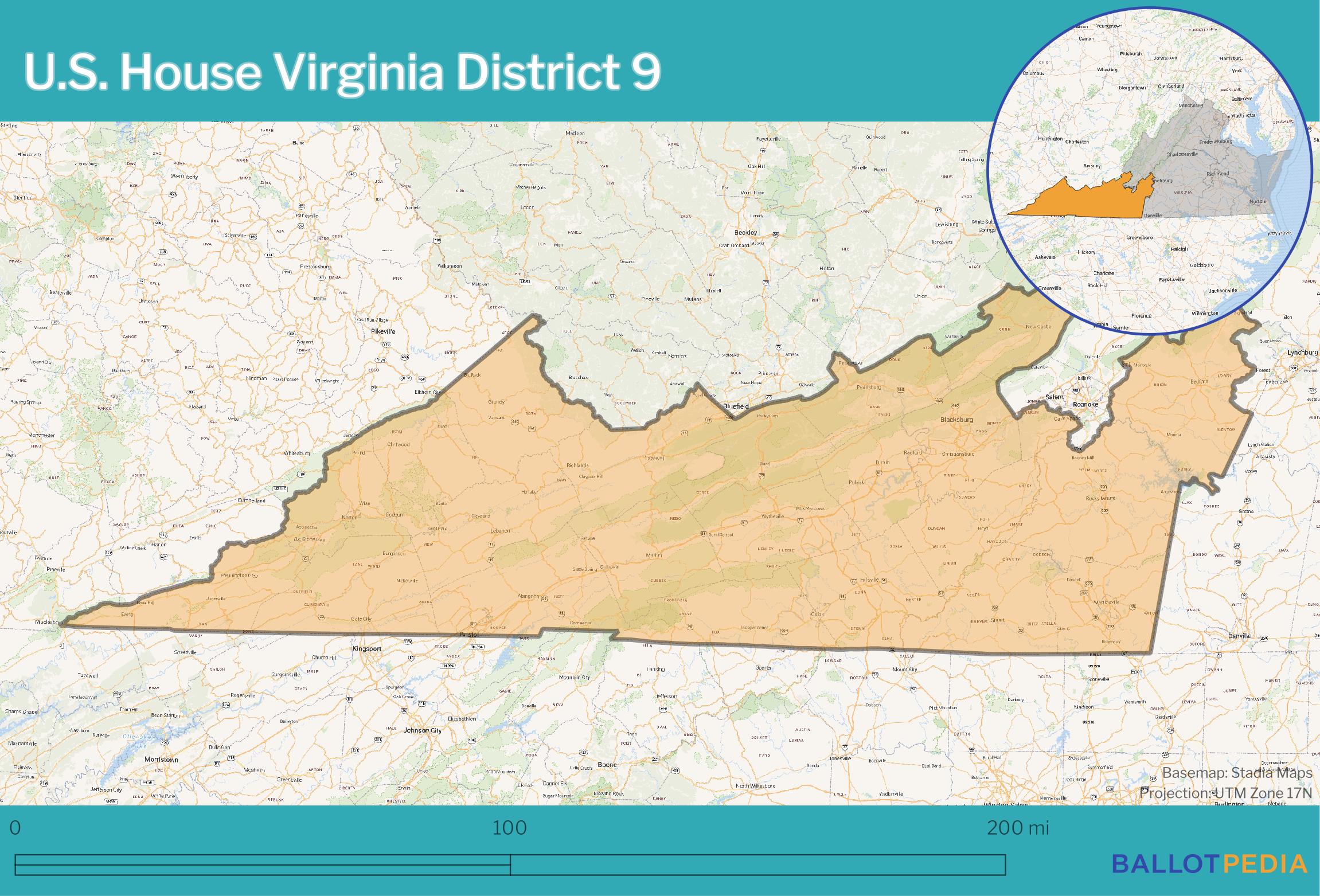Virginia's 9th Congressional District election, 2024
U.S. Senate • U.S. House • Special state legislative • State ballot measures • Local ballot measures • School boards • Municipal • How to run for office |
2026 →
← 2022
|
| Virginia's 9th Congressional District |
|---|
| Democratic primary Republican primary General election |
| Election details |
| Filing deadline: April 4, 2024 |
| Primary: June 18, 2024 General: November 5, 2024 |
| How to vote |
| Poll times: 6 a.m. to 7 p.m. Voting in Virginia |
| Race ratings |
DDHQ and The Hill: Safe Republican Inside Elections: Solid Republican Sabato's Crystal Ball: Safe Republican |
| Ballotpedia analysis |
| U.S. Senate battlegrounds U.S. House battlegrounds Federal and state primary competitiveness Ballotpedia's Election Analysis Hub, 2024 |
| See also |
U.S. Senate • 1st • 2nd • 3rd • 4th • 5th • 6th • 7th • 8th • 9th • 10th • 11th Virginia elections, 2024 U.S. Congress elections, 2024 U.S. Senate elections, 2024 U.S. House elections, 2024 |
All U.S. House districts, including the 9th Congressional District of Virginia, held elections in 2024. The general election was November 5, 2024. The primary was June 18, 2024. The filing deadline was April 4, 2024. The outcome of this race affected the partisan balance of the U.S. House of Representatives in the 119th Congress. All 435 House districts were up for election.
At the time of the election, Republicans held a 220-212 majority with three vacancies.[1] As a result of the election, Republicans retained control of the U.S. House, winning 220 seats to Democrats' 215.[2] To read more about the 2024 U.S. House elections, click here.
In the 2022 election in this district, the Republican candidate won 73.2%-26.5%. Daily Kos calculated what the results of the 2020 presidential election in this district would have been following redistricting. Donald Trump (R) would have defeated Joe Biden (D) 70.3%-28.5%.[3]
For more information about the primaries in this election, click on the links below:
- Virginia's 9th Congressional District election, 2024 (June 18 Democratic primary)
- Virginia's 9th Congressional District election, 2024 (June 18 Republican primary)
Candidates and election results
General election
General election for U.S. House Virginia District 9
Incumbent H. Morgan Griffith defeated Karen Baker in the general election for U.S. House Virginia District 9 on November 5, 2024.
Candidate | % | Votes | ||
| ✔ |  | H. Morgan Griffith (R) | 72.5 | 290,645 |
 | Karen Baker (D)  | 27.3 | 109,570 | |
| Other/Write-in votes | 0.2 | 748 | ||
| Total votes: 400,963 | ||||
 = candidate completed the Ballotpedia Candidate Connection survey. = candidate completed the Ballotpedia Candidate Connection survey. | ||||
| If you are a candidate and would like to tell readers and voters more about why they should vote for you, complete the Ballotpedia Candidate Connection Survey. | ||||
Do you want a spreadsheet of this type of data? Contact our sales team. | ||||
Democratic primary election
The Democratic primary election was canceled. Karen Baker advanced from the Democratic primary for U.S. House Virginia District 9.
Republican primary election
The Republican primary election was canceled. Incumbent H. Morgan Griffith advanced from the Republican primary for U.S. House Virginia District 9.
Candidate profiles
This section includes candidate profiles that may be created in one of two ways: either the candidate completed Ballotpedia's Candidate Connection survey, or Ballotpedia staff may compile a profile based on campaign websites, advertisements, and public statements after identifying the candidate as noteworthy. For more on how we select candidates to include, click here.

Party: Democratic Party
Incumbent: No
Submitted Biography: "Born and raised in the heartland of America, Karen’s journey from a small Midwestern town to the forefront of legal and healthcare advocacy showcases her dedication to fighting for those in need. A proud alumna of William Smith College with a degree in comparative religion, followed by earning a J.D. from Catholic University Law School, Baker has tirelessly worked to uphold the principles of fairness and equality. As a trial lawyer for the Equal Employment Opportunity Commission, she was a formidable force against discrimination, ensuring that all individuals, regardless of sex, race, or age, received justice. Beyond her legal career, Baker served as an Administrative Law Judge for the Social Security Administration for 17 years, further solidifying her role as a champion for Americans' rights and needs. Her commitment to public service also extends into her personal life: Raising her son as a single mother and caring for her husband through a debilitating health battle, Karen’s experiences are deeply rooted in her understanding of the challenges facing families in the 9th District. Transitioning from law to healthcare, Karen further demonstrated her commitment to serving her community by becoming a registered nurse and working in the intensive care unit of a small rural hospital. Her diverse background in legal advocacy and frontline healthcare uniquely positions her to address the vast array of issues facing residents of Southwest Virginia."
![]()
This information was current as of the candidate's run for U.S. House Virginia District 9 in 2024.
Voting information
- See also: Voting in Virginia
Ballotpedia's Candidate Connection survey responses
Ballotpedia asks all federal, state, and local candidates to complete a survey and share what motivates them on political and personal levels. The section below shows responses from candidates in this race who completed Ballotpedia's Candidate Connection survey. Candidates are asked three required questions for this survey, but they may answer additional optional questions as well.

Survey responses from candidates in this race
Click on a candidate's name to visit their Ballotpedia page.
Note: Ballotpedia reserves the right to edit Candidate Connection survey responses. Any edits made by Ballotpedia will be clearly marked with [brackets] for the public. If the candidate disagrees with an edit, he or she may request the full removal of the survey response from Ballotpedia.org. Ballotpedia does not edit or correct typographical errors unless the candidate's campaign requests it.
| Collapse all

Karen Baker (D)
Healthcare: Too many rural people do not live close enough to hospitals and critical care units to ensure positive healthcare outcomes. Healthcare, like education, should not depend on your zip code. We need to expand the Federal PACE program which has been so successful in allowing seniors to age safely in place. Baker wants to scale programs like this up and tailor them to other rural areas. “It can be used as a model for an All-inclusive Family Care Center (AFCC) that will be unique to rural communities. Providing comprehensive healthcare from birth to death in rural areas where geography can be a barrier, will be a priority for me in Washington.”
Agriculture: Small family farms need access to markets and processing facilities usually closed to smaller farmers. “I will increase the number of USDA Inspectors and decentralize processing plants with regional abattoirs.” Baker says “opening markets up to smaller farmers is good for our farmers and ultimately for grocery prices. Bigger doesn’t always mean better, especially in rural areas. We aim to keep wages and profits in our local economy, not in shareholder dividends on Wall Street".

Karen Baker (D)

Karen Baker (D)

Karen Baker (D)

Karen Baker (D)

Karen Baker (D)
In the context of the U.S. Congress, where differing views reflect the varied priorities of the nation’s populace, compromise ensures that multiple perspectives are considered in the creation of laws. This approach helps in producing balanced policies that are more comprehensive and sustainable. It also prevents gridlock, which can stall important legislative action needed to address pressing issues.
Compromise does not mean abandoning one's values but rather working within a framework that respects different ideologies and finds solutions that most parties can agree on. It’s about the pragmatic evaluation of possible benefits against ideological purity and striving for progress rather than perfection.
Karen Baker (D)
Campaign finance
| Name | Party | Receipts* | Disbursements** | Cash on hand | Date |
|---|---|---|---|---|---|
| H. Morgan Griffith | Republican Party | $1,005,037 | $1,130,384 | $463,889 | As of December 31, 2024 |
| Karen Baker | Democratic Party | $223,833 | $224,246 | $-11,516 | As of December 31, 2024 |
|
Source: Federal Elections Commission, "Campaign finance data," 2024. This product uses the openFEC API but is not endorsed or certified by the Federal Election Commission (FEC).
* According to the FEC, "Receipts are anything of value (money, goods, services or property) received by a political committee." |
|||||
General election race ratings
- See also: Race rating definitions and methods
Ballotpedia provides race ratings from four outlets: The Cook Political Report, Inside Elections, Sabato's Crystal Ball, and DDHQ/The Hill. Each race rating indicates if one party is perceived to have an advantage in the race and, if so, the degree of advantage:
- Safe and Solid ratings indicate that one party has a clear edge and the race is not competitive.
- Likely ratings indicate that one party has a clear edge, but an upset is possible.
- Lean ratings indicate that one party has a small edge, but the race is competitive.[4]
- Toss-up ratings indicate that neither party has an advantage.
Race ratings are informed by a number of factors, including polling, candidate quality, and election result history in the race's district or state.[5][6][7]
| Race ratings: Virginia's 9th Congressional District election, 2024 | |||||||||
|---|---|---|---|---|---|---|---|---|---|
| Race tracker | Race ratings | ||||||||
| November 5, 2024 | October 29, 2024 | October 22, 2024 | October 15, 2024 | ||||||
| The Cook Political Report with Amy Walter | Solid Republican | Solid Republican | Solid Republican | Solid Republican | |||||
| Decision Desk HQ and The Hill | Safe Republican | Safe Republican | Safe Republican | Safe Republican | |||||
| Inside Elections with Nathan L. Gonzales | Solid Republican | Solid Republican | Solid Republican | Solid Republican | |||||
| Larry J. Sabato's Crystal Ball | Safe Republican | Safe Republican | Safe Republican | Safe Republican | |||||
| Note: Ballotpedia reviews external race ratings every week throughout the election season and posts weekly updates even if the media outlets have not revised their ratings during that week. | |||||||||
Ballot access
The table below details filing requirements for U.S. House candidates in Virginia in the 2024 election cycle. For additional information on candidate ballot access requirements in Virginia, click here.
| Filing requirements for U.S. House candidates, 2024 | ||||||
|---|---|---|---|---|---|---|
| State | Office | Party | Signatures required | Filing fee | Filing deadline | Source |
| Virginia | U.S. House | Ballot-qualified party | 1,000 | $3,480.00 | 4/4/2024 | Source |
| Virginia | U.S. House | Unaffiliated | 1,000 | N/A | 6/18/2024 | Source |
District analysis
Click the tabs below to view information about voter composition, past elections, and demographics in both the district and the state.
- District map - A map of the district in place for the election.
- Competitiveness - Information about the competitiveness of 2024 U.S. House elections in the state.
- Presidential elections - Information about presidential elections in the district and the state.
- State party control - The partisan makeup of the state's congressional delegation and state government.
Below was the map in use at the time of the election. Click the map below to enlarge it.

This section contains data on U.S. House primary election competitiveness in Virginia.
| Virginia U.S. House competitiveness, 2014-2024 | ||||||||||||||
|---|---|---|---|---|---|---|---|---|---|---|---|---|---|---|
| Office | Districts/ offices |
Seats | Open seats | Candidates | Possible primaries | Contested Democratic primaries | Contested Republican primaries | % of contested primaries | Incumbents in contested primaries | % of incumbents in contested primaries | ||||
| 2024 | 11 | 11 | 2 | 53 | 22 | 6 | 3 | 40.9% | 2 | 22.2% | ||||
| 2022 | 11 | 11 | 0 | 33 | 16[8] | 1 | 4 | 31.3% | 2 | 18.2% | ||||
| 2020 | 11 | 11 | 0 | 31 | 15[9] | 4 | 2 | 40.0% | 2 | 18.2% | ||||
| 2018 | 11 | 11 | 2 | 37 | 17[10] | 6 | 3 | 52.9% | 2 | 22.2% | ||||
| 2016 | 11 | 11 | 2 | 29 | 20[11] | 1 | 4 | 25.0% | 2 | 22.2% | ||||
| 2014 | 11 | 11 | 2 | 32 | 20[12] | 1 | 3 | 20.0% | 2 | 22.2% | ||||
Post-filing deadline analysis
The following analysis covers all U.S. House districts up for election in Virginia in 2024. Information below was calculated on June 16, 2024, and may differ from information shown in the table above due to candidate replacements and withdrawals after that time.
Fifty-three candidates ran for Virginia’s 11 U.S. House districts, including 33 Democrats and 20 Republicans. That’s an average of 4.81 candidates per district.
This was also the most candidates who ran in primary elections in Virginia in the last 10 years.
The 7th and 10th Congressional Districts were open in 2024. The last time a seat was open in Virginia was in 2018 when two seats were open.
Incumbent Rep. Abigail Spanberger (D-07) did not run for re-election because she will run for Governor of Virginia in 2025. Incumbent Rep. Jennifer Wexton (D-10) retired from public office.
Sixteen candidates—12 Democrats and four Republicans—ran for the open 10th Congressional District, the most candidates who ran for a district in Virginia in 2024.
Nine primaries—six Democratic and three Republican—were contested in 2024. Between 2014 and 2022, an average of 5.8 primaries were contested each election year.
Two incumbents—Gerald Edward Connolly (D-11) and Bob Good (R-05)—were in contested primaries in 2024. Since 2014, there have been two incumbents in contested primaries in Virginia in every election year.
Candidates filed to run in the Republican and Democratic primaries in all 11 districts, meaning no seats are guaranteed to either party.Partisan Voter Index
Heading into the 2024 elections, based on results from the 2020 and 2016 presidential elections, the Cook Partisan Voter Index for this district was R+23. This meant that in those two presidential elections, this district's results were 23 percentage points more Republican than the national average. This made Virginia's 9th the 20th most Republican district nationally.[13]
2020 presidential election results
The table below shows what the vote in the 2020 presidential election would have been in this district. The presidential election data was compiled by Daily Kos.
| 2020 presidential results in Virginia's 9th based on 2024 district lines | ||||
|---|---|---|---|---|
| Joe Biden |
Donald Trump | |||
| 28.5% | 70.3% | |||
Inside Elections Baselines
- See also: Inside Elections
Inside Elections' Baseline is a figure that analyzes all federal and statewide election results from the district over the past four election cycles. The results are combined in an index estimating the strength of a typical Democratic or Republican candidate in the congressional district.[14] The table below displays the Baseline data for this district.
| Inside Elections Baseline for 2024 | ||||
|---|---|---|---|---|
| Democratic Baseline |
Republican Baseline |
Difference | ||
| 28.9 | 70.2 | D+41.3 | ||
Presidential voting history
- See also: Presidential election in Virginia, 2020
Virginia presidential election results (1900-2020)
- 17 Democratic wins
- 14 Republican wins
| Year | 1900 | 1904 | 1908 | 1912 | 1916 | 1920 | 1924 | 1928 | 1932 | 1936 | 1940 | 1944 | 1948 | 1952 | 1956 | 1960 | 1964 | 1968 | 1972 | 1976 | 1980 | 1984 | 1988 | 1992 | 1996 | 2000 | 2004 | 2008 | 2012 | 2016 | 2020 |
|---|---|---|---|---|---|---|---|---|---|---|---|---|---|---|---|---|---|---|---|---|---|---|---|---|---|---|---|---|---|---|---|
| Winning Party | D | D | D | D | D | D | D | R | D | D | D | D | D | R | R | R | D | R | R | R | R | R | R | R | R | R | R | D | D | D | D |
Congressional delegation
The table below displays the partisan composition of Virginia's congressional delegation as of May 2024.
| Congressional Partisan Breakdown from Virginia | |||
|---|---|---|---|
| Party | U.S. Senate | U.S. House | Total |
| Democratic | 2 | 6 | 8 |
| Republican | 0 | 5 | 5 |
| Independent | 0 | 0 | 0 |
| Vacancies | 0 | 0 | 0 |
| Total | 2 | 11 | 13 |
State executive
The table below displays the officeholders in Virginia's top four state executive offices as of May 2024.
| State executive officials in Virginia, May 2024 | |
|---|---|
| Office | Officeholder |
| Governor | |
| Lieutenant Governor | |
| Secretary of State | |
| Attorney General | |
State legislature
Virginia State Senate
| Party | As of February 2024 | |
|---|---|---|
| Democratic Party | 21 | |
| Republican Party | 19 | |
| Other | 0 | |
| Vacancies | 0 | |
| Total | 40 | |
Virginia House of Delegates
| Party | As of February 2024 | |
|---|---|---|
| Democratic Party | 51 | |
| Republican Party | 49 | |
| Other | 0 | |
| Vacancies | 0 | |
| Total | 100 | |
Trifecta control
The table below shows the state's trifecta status from 1992 until the 2024 election.
Virginia Party Control: 1992-2024
Four years of Democratic trifectas • Four years of Republican trifectas
Scroll left and right on the table below to view more years.
| Year | 92 | 93 | 94 | 95 | 96 | 97 | 98 | 99 | 00 | 01 | 02 | 03 | 04 | 05 | 06 | 07 | 08 | 09 | 10 | 11 | 12 | 13 | 14 | 15 | 16 | 17 | 18 | 19 | 20 | 21 | 22 | 23 | 24 |
|---|---|---|---|---|---|---|---|---|---|---|---|---|---|---|---|---|---|---|---|---|---|---|---|---|---|---|---|---|---|---|---|---|---|
| Governor | D | D | R | R | R | R | R | R | R | R | D | D | D | D | D | D | D | D | R | R | R | R | D | D | D | D | D | D | D | D | R | R | R |
| Senate | D | D | D | D | S | S | R | R | R | R | R | R | R | R | R | R | D | D | D | D | R | R | D | R | R | R | R | R | D | D | D | D | D |
| House | D | D | D | D | D | D | S | S | R | R | R | R | R | R | R | R | R | R | R | R | R | R | R | R | R | R | R | R | D | D | R | R | D |
District history
The section below details election results for this office in elections dating back to 2018.
General election
General election for U.S. House Virginia District 9
Incumbent H. Morgan Griffith (R) defeated Taysha DeVaughan (D) in the general election for U.S. House Virginia District 9 on November 8, 2022.
Candidate | % | Votes | ||
| ✔ |  | H. Morgan Griffith (R) | 73.2 | 182,207 |
 | Taysha DeVaughan (D)  | 26.5 | 66,027 | |
| Other/Write-in votes | 0.2% | 555 | ||
| Total votes: 248,789 | ||||
 = candidate completed the Ballotpedia Candidate Connection survey. = candidate completed the Ballotpedia Candidate Connection survey. | ||||
| If you are a candidate and would like to tell readers and voters more about why they should vote for you, complete the Ballotpedia Candidate Connection Survey. | ||||
Do you want a spreadsheet of this type of data? Contact our sales team. | ||||
Democratic primary
The Democratic primary scheduled for June 21, 2022, was canceled.
Withdrawn or disqualified candidates
- Taysha DeVaughan (D)
Republican primary
The Republican primary scheduled for June 21, 2022, was canceled. Incumbent H. Morgan Griffith (R) advanced from the Republican primary for U.S. House Virginia District 9 without appearing on the ballot.
Withdrawn or disqualified candidates
Democratic convention
The Democratic convention scheduled for May 21, 2022, was canceled. Taysha DeVaughan (D) advanced from the Democratic convention for U.S. House Virginia District 9 without appearing on the ballot.
General election
General election for U.S. House Virginia District 9
Incumbent H. Morgan Griffith (R) defeated Cameron Dickerson (Independent) in the general election for U.S. House Virginia District 9 on November 3, 2020.
Candidate | % | Votes | ||
| ✔ |  | H. Morgan Griffith (R) | 94.0 | 271,851 |
 | Cameron Dickerson (Independent) (Write-in) | 0.0 | 0 | |
| Other/Write-in votes | 6.0% | 17,423 | ||
| Total votes: 289,274 | ||||
 = candidate completed the Ballotpedia Candidate Connection survey. = candidate completed the Ballotpedia Candidate Connection survey. | ||||
| If you are a candidate and would like to tell readers and voters more about why they should vote for you, complete the Ballotpedia Candidate Connection Survey. | ||||
Do you want a spreadsheet of this type of data? Contact our sales team. | ||||
Republican primary
The Republican primary scheduled for June 23, 2020, was canceled. Incumbent H. Morgan Griffith (R) advanced from the Republican primary for U.S. House Virginia District 9 without appearing on the ballot.
Democratic convention
The Democratic convention scheduled for May 2, 2020, was canceled.
Withdrawn or disqualified candidates
General election
General election for U.S. House Virginia District 9
Incumbent H. Morgan Griffith (R) defeated Anthony Flaccavento (D) in the general election for U.S. House Virginia District 9 on November 6, 2018.
Candidate | % | Votes | ||
| ✔ |  | H. Morgan Griffith (R) | 65.2 | 160,933 |
 | Anthony Flaccavento (D) | 34.8 | 85,833 | |
| Other/Write-in votes | 0.1% | 214 | ||
| Total votes: 246,9800 | ||||
 = candidate completed the Ballotpedia Candidate Connection survey. = candidate completed the Ballotpedia Candidate Connection survey. | ||||
| If you are a candidate and would like to tell readers and voters more about why they should vote for you, complete the Ballotpedia Candidate Connection Survey. | ||||
Do you want a spreadsheet of this type of data? Contact our sales team. | ||||
Withdrawn or disqualified candidates
- Scott Blankenship (Independent)
Democratic primary
Democratic primary for U.S. House Virginia District 9
Anthony Flaccavento (D) defeated Justin Santopietro (D) in the Democratic primary for U.S. House Virginia District 9 on June 12, 2018.
Candidate | % | Votes | ||
| ✔ |  | Anthony Flaccavento | 78.6 | 10,756 |
 | Justin Santopietro | 21.4 | 2,921 | |
| Total votes: 13,677 | ||||
 = candidate completed the Ballotpedia Candidate Connection survey. = candidate completed the Ballotpedia Candidate Connection survey. | ||||
| If you are a candidate and would like to tell readers and voters more about why they should vote for you, complete the Ballotpedia Candidate Connection Survey. | ||||
Do you want a spreadsheet of this type of data? Contact our sales team. | ||||
Republican primary
Republican primary for U.S. House Virginia District 9
Incumbent H. Morgan Griffith (R) advanced from the Republican primary for U.S. House Virginia District 9 on June 12, 2018.
Candidate | ||
| ✔ |  | H. Morgan Griffith |
 = candidate completed the Ballotpedia Candidate Connection survey. = candidate completed the Ballotpedia Candidate Connection survey. | ||||
| If you are a candidate and would like to tell readers and voters more about why they should vote for you, complete the Ballotpedia Candidate Connection Survey. | ||||
Do you want a spreadsheet of this type of data? Contact our sales team. | ||||
See also
External links
Footnotes
- ↑ A majority in the U.S. House when there are no vacancies is 218 seats.
- ↑ These figures include the seat of Rep. Matt Gaetz (R-Fla.), who resigned on Nov. 13, 2024, after winning re-election.
- ↑ Daily Kos, "Daily Kos Elections' 2020 presidential results by congressional district, for new and old districts," accessed September 15, 2022
- ↑ Inside Elections also uses Tilt ratings to indicate an even smaller advantage and greater competitiveness.
- ↑ Amee LaTour, "Email correspondence with Nathan Gonzalez," April 19, 2018
- ↑ Amee LaTour, "Email correspondence with Kyle Kondik," April 19, 2018
- ↑ Amee LaTour, "Email correspondence with Charlie Cook," April 22, 2018
- ↑ Six district parties chose to hold nominating conventions or caucuses instead of primaries. Those are not included in the total for number of possible primaries.
- ↑ Seven district parties chose to hold nominating conventions or caucuses instead of primaries. Those are not included in the total for number of possible primaries.
- ↑ Five district parties chose to hold nominating conventions or caucuses instead of primaries. Those are not included in the total for number of possible primaries.
- ↑ Two district parties chose to hold nominating conventions or caucuses instead of primaries. Those are not included in the total number of possible primaries.
- ↑ Two district parties chose to hold nominating conventions or caucuses instead of primaries. Those are not included in the total number of possible primaries.
- ↑ Cook Political Report, "The 2022 Cook Partisan Voting Index (Cook PVI℠)," accessed January 10, 2024
- ↑ Inside Elections, "Methodology: Inside Elections’ Baseline by Congressional District," December 8, 2023








